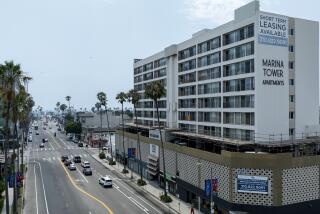Dogfight in plane leasing shapes up
- Share via
A battle between two big names in aircraft leasing is underway, with Los Angeles billionaire Steven Udvar-Hazy’s Air Lease Corp. now armed with about $868 million from its initial public offering to buy new jets.
In its first day of trading on the New York Stock Exchange, the Century City company known as ALC saw its stock close at $27.95 a share Tuesday. That’s up 5.5% from its IPO price of $26.50. The company sold 34.8 million shares in the initial offer, 9.8 million more than it had anticipated.
The IPO marks the return to public markets by Udvar-Hazy, 65, known as the godfather of the aircraft-leasing industry.
Udvar-Hazy, a Hungarian emigre, made a name for himself pioneering the business of buying planes and leasing them to airlines after co-founding International Lease Finance Corp., or ILFC, nearly four decades ago. Today, Udvar-Hazy works in Century City just two blocks away from ILFC, the huge airliner-renting business he built and now competes with.
For now, in terms of fleet size, it’s a David versus Goliath contest. ALC now has just 46 aircraft with plans to expand to about 100 planes by the end of the year. It will take time before ALC has a fleet rivaling that of ILFC, which has about 930 aircraft.
With plush headquarters at MGM Tower on Constellation Boulevard, ILFC is an established brand with long-standing business relationships with nearly every major airline around the globe, recording $4.7 billion in revenue last year.
Over at its modest offices on Avenue of the Stars, ALC had $58 million in revenue last year and took on loads of debt to buy planes and get started.
Still, Udvar-Hazy remains an industry icon and donated $66 million to help build the Smithsonian National Air and Space Museum annex. His stature in the business helped him woo other top executives from ILFC.
“I’m sure ILFC is sweating,” said Richard Aboulafia, an analyst at aerospace research firm Teal Group Corp. in Fairfax, Va. “He’s certainly taken a lot of talent with him.”
Udvar-Hazy became one of the richest men in Los Angeles when he sold ILFC to insurance giant American International Group Inc. in 1990. He stayed on after the deal to run ILFC.
But the relationship soured after AIG needed a federal bailout in September 2008 to stay afloat, giving the government oversight of the company and its units, including ILFC.
Udvar-Hazy left ILFC in February 2010 and quickly formed ALC, tapping contacts made during 40 years in the business.
He raised $3.3 billion from some high-profile investors, including Ares Management and financier Wilbur Ross.
“This industry’s got strong competitive tendencies,” Aboulafia said. “But there’s a little less friction than you would think because ILFC’s got a much larger fleet with a different growth strategy.”
Both companies declined to comment for this report.
ALC has said it will use the money raised in the IPO to buy more aircraft. The start-up has announced deals to buy 153 new aircraft and 10 used aircraft through 2017.
Udvar-Hazy has said that the fleet sizes of competitors -- for example, ILFC and industry giant GE Capital Aviation Services, which has about 1,800 aircraft -- can also work against them, because older planes are often gas-guzzlers.
This comes at a time when jet fuel prices have increased about 50% in the last 12 months, according to the International Air Transport Assn. Fuel typically represents 25% to 30% of an airline’s overall expenses.
Udvar-Hazy has focused on acquiring newer models such as Boeing 737s and Airbus A320s, which tend to be more fuel-efficient. The company believes that short-haul flights are key to being successful in the U.S. and emerging markets such as Asia, Africa, Latin America and the Middle East where fast economic growth is driving an increase in air traffic.
Passenger totals and the percentage of airplane seats that are filled have increased 12 straight months for the nation’s largest airlines. The latest data from the U.S. Bureau of Transportation Statistics show that U.S. airlines carried 53.7 million passengers in January, up 2.2% from a year earlier.
That bodes well for aircraft makers like Boeing Co. in Chicago and Airbus in France and Germany. So while ALC has just 36 full-time employees, the company has a massive influence on thousands of aircraft parts suppliers in Southern California.
“Aircraft manufacturers will be happy to have Hazy back in the business and expect him to be a big customer,” said Tom Captain, aerospace analyst with Deloitte. “The public listing shows bullishness in the aircraft leasing business and for a business run by Hazy.”
--
More to Read
Inside the business of entertainment
The Wide Shot brings you news, analysis and insights on everything from streaming wars to production — and what it all means for the future.
You may occasionally receive promotional content from the Los Angeles Times.











